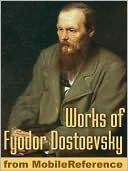- Biblia
- Leer la Biblia
- Versiones de la Biblia
- Verso del dia
- Planes de lectura
- Versos por tema
- Books of the Bible
- Imágenes De La Biblia
- Estudio
- Comentarios
- Concordancias
- Diccionarios bíblicos
- Enciclopedias bíblicas
- Sermones
- Bible Atlas & Maps
- BP Wiki
- Devocionales
- Devocionales de hoy
- Light of the World
- Todos los devocionales
- Inspirational Quotes
- Más
- Picture Quotes
- Videos
- Inspirador
- Estudio Bíblico
- Lo que dice la Biblia
- Bible Q&As
- Daily Bread
- Bible by Genre
- Bible Stories
- Random Bible Verse
- Comunidad
- Store
Works of Fyodor Dostoevsky: Crime and Punishment, The Idiot, The Brothers Karamazov, The Gambler, The Devils, The Adolescent & more
by Fyodor Dostoevsky
Three full length novels collected in one edition formatted for the Kindle.
FYODOR MIKHAILOVICH DOSTOYEVSKY [1821-1881] was a Russian writer of novels and short stories .
In 1841, he graduated from Saint Petersburg Academy of Military Engineering. In 1845, he published his first novel Poor Folk in the magazine Sovremennik. The poet Nikolai Nekrasov, editor of the magazine, said of Dostoyevsky, "a new Gogol has arisen!" In 1846, he published The Double. It was received with dissaponting reaction. In 1849, he was arrested and sentenced to death for being a member of the Petrashevsky Circle. The sentence was reduced to four years hard labor at a prison camp in Omsk, Siberia. Of the experience he wrote, "In summer, intolerable closeness; in winter, unendurable cold. All the floors were rotten. Filth on the floors an inch thick; one could slip and fall... We were packed like herrings in a barrel...There was no room to turn around. From dusk to dawn it was impossible not to behave like pigs... Fleas, lice, and black beetles by the bushel..." In 1854, and was required to serve five years in the Russian army at Semipalatinsk, Kazakhstan. In 1866, he published Crime and Punishment which made him one of Russia's most popular authors. In 1867, he published The Gambler. He had become a frequent visitor to casinos and wrote the book to pay debts. From 1873 to 1881, he published the Writer's Diary, a magazine of short stories and articles on current events.
Many leading authors have been influenced by him including Proust, Faulkner, Camus, Kafka, Kerouac, and Salinger. Hemingway cited his influence in A Moveable Feast. James Joyce said of him, "...he is the man more than any other who has created modern prose ..."
FYODOR MIKHAILOVICH DOSTOYEVSKY [1821-1881] was a Russian writer of novels and short stories .
In 1841, he graduated from Saint Petersburg Academy of Military Engineering. In 1845, he published his first novel Poor Folk in the magazine Sovremennik. The poet Nikolai Nekrasov, editor of the magazine, said of Dostoyevsky, "a new Gogol has arisen!" In 1846, he published The Double. It was received with dissaponting reaction. In 1849, he was arrested and sentenced to death for being a member of the Petrashevsky Circle. The sentence was reduced to four years hard labor at a prison camp in Omsk, Siberia. Of the experience he wrote, "In summer, intolerable closeness; in winter, unendurable cold. All the floors were rotten. Filth on the floors an inch thick; one could slip and fall... We were packed like herrings in a barrel...There was no room to turn around. From dusk to dawn it was impossible not to behave like pigs... Fleas, lice, and black beetles by the bushel..." In 1854, and was required to serve five years in the Russian army at Semipalatinsk, Kazakhstan. In 1866, he published Crime and Punishment which made him one of Russia's most popular authors. In 1867, he published The Gambler. He had become a frequent visitor to casinos and wrote the book to pay debts. From 1873 to 1881, he published the Writer's Diary, a magazine of short stories and articles on current events.
Many leading authors have been influenced by him including Proust, Faulkner, Camus, Kafka, Kerouac, and Salinger. Hemingway cited his influence in A Moveable Feast. James Joyce said of him, "...he is the man more than any other who has created modern prose ..."
BUY NOW
Kindle Edition
Published (first published January 9th 2012)
Suscribir
© 2025 Bibleportal.com Reservados todos los derechos.

Fyodor Mikhaylovich Dostoyevsky was a Russian writer, essayist and philosopher, perhaps most recognized today for his novels Crime and Punishment and The Brothers Karamazov.
Dostoyevsky's literary output explores human psychology in the troubled political, social and spiritual context of 19th-century Russian society. Considered by many as a founder or precursor of 20th-century existentialism, his Notes from Underground (1864), written in the embittered voice of the anonymous "underground man", was called by Walter Kaufmann the "best overture for existentialism ever written."
His tombstone reads "Verily, Verily, I say unto you, Except a corn of wheat fall into the ground and die, it abideth alone: but if it die, it bringeth forth much fruit." from John 12:24, which is also the epigraph of his final novel, The Brothers Karamazov.
... Show more